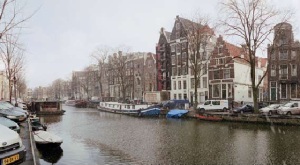No, no, it’s in north west Croydon!
One funny thing with the Ivory Coast is that when people hear it out of context, often they don’t straight away connect it to: Country, West Africa. Unlike say, the unambiguously named Central African Republic.
A typical example would be somebody asking: “So, where are you going on holidays?” And I go: “Oh, to the Ivory Coast.” And if I don’t immediately say “in West Africa” or “you know, where Drogba is from” they either have this blank stare not knowing what hit them, or the conversation just goes on, and later you have the “Oh, are you going to AFRICA!!!” moment, sometimes followed by “I thought it was somewhere in southern Spain”
Or today, when asking the human resource department for a letter needed to get a visa for the Ivory Coast (and that’s a story onto itself), I got the more unusual: “That’s one of those French islands, right?”
Touva or bust!
Now this was supposed to connect to the late Nobel laureate physicist Richard Feynman somehow. One lesser known fact about Feynman is that he had this hook-up on a place called Touva. When he talks about it in a (highly recommended) video called The Last Journey of a Genius , he puts words to an attitude about travelling I’ve think I’ve had since early teens involving visiting a lot of odd places.
It’s about travelling being a passion for adventure, for exploring new places and a general curiosity about the world. Instead of that package holiday to a beach in southern Spain, I’ve kind of always chosen places like eastern Belarus, Burma, the night train between Tblisi and Baku, northern Albania or Montevideo. And if given the chance to visit a country where the capital is called Yamoussoukro, it just has to be done!
Here’s Richard Feynman talking about Touva:
“He said you are making up a country that doesn’t exist! I said Oh yeah. I got the encyclopedia and we looked it up on a map. Sure enough there is a Tannu Touva, and that was a surprise, but where was it? Just outside outer Mongolia, in the middle of central Asia, in the depths of Russia, far away from anything. And it was no longer an independent country, it was part of Russia. And we saw that the capital – this is what did it – was KYZYL. My wife and I and he, at the same time looked and smiled grinned at each other. Because any place that’s got a capital called KYZYL just got to be interesting!
I know how I act. I’m an explorer, ok. I get curious about everything. I want to investigate all kinds of stuff.
Let’s go back to what we are doing. One day we look at a map and it’s capital’s K-Y-Z-Y-L We decided it would be fun to go there because it’s so obscure. It’s a game, it’s not serious, it doesn’t involve some deep philosophical point of view of authorities or anything, it’s just fun of having an adventure to try to go to a land we never heard of that we knew was an independent country once, it’s no longer an independent country. Find out what it’s like, and discover as we went along … that it’s isolated makes it more interesting. You know many explorers like to go to places that are unusual.
I know we were all excited to go, but you see, even if we didnt go to Touva that would have been interesting too. You got to understand every plot, even though there is a high chance of failure, as far as the ultimate aim was concerned, would always turn out [inaudible] supposed to be a big adventure after all. It ain’t everybody that goes across to visit a throat singing conference in the western part of Mongolia.”





